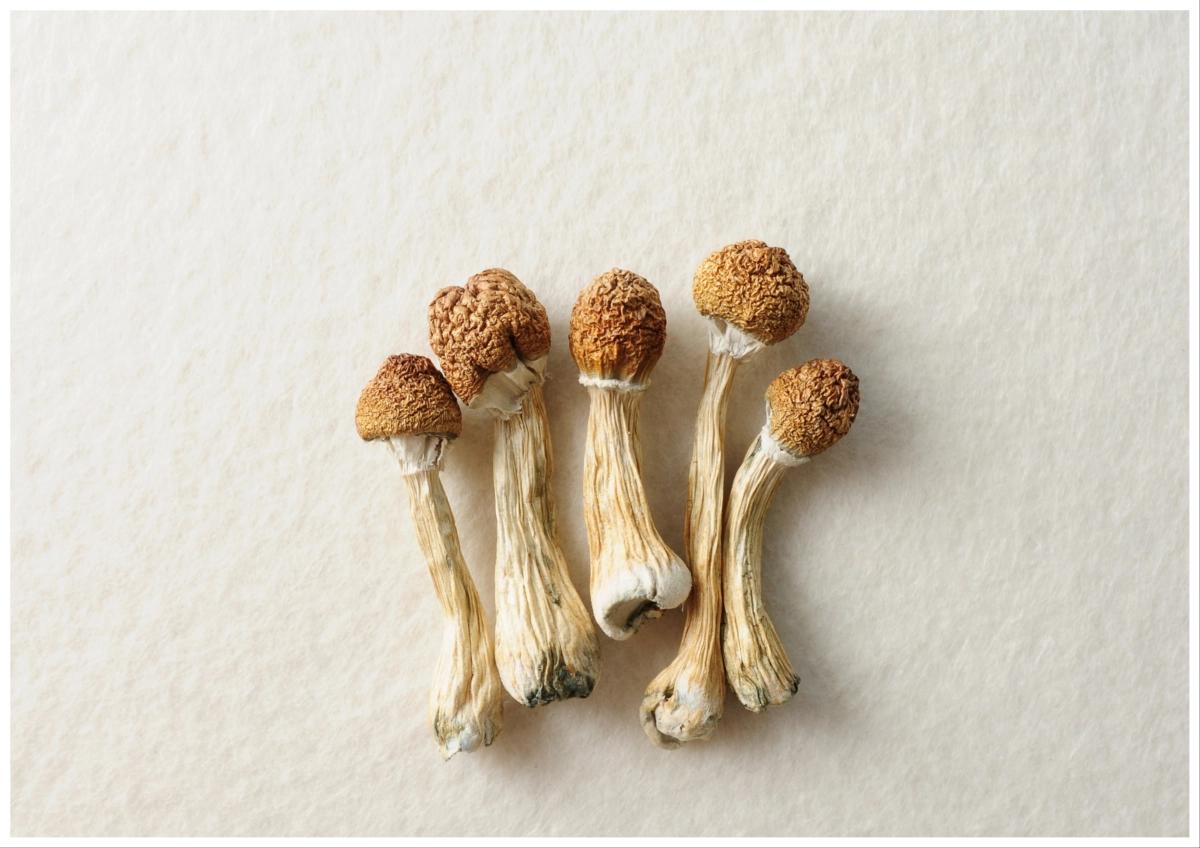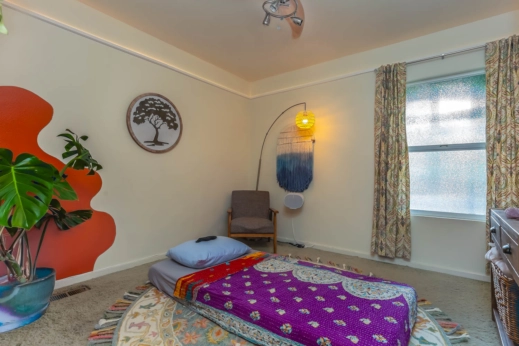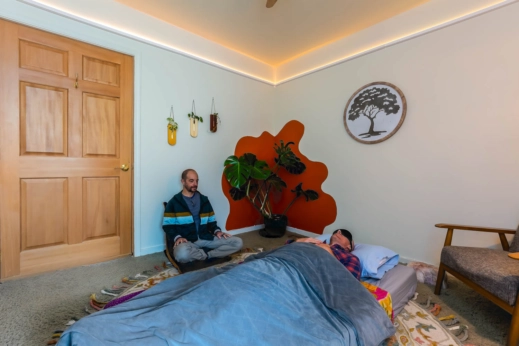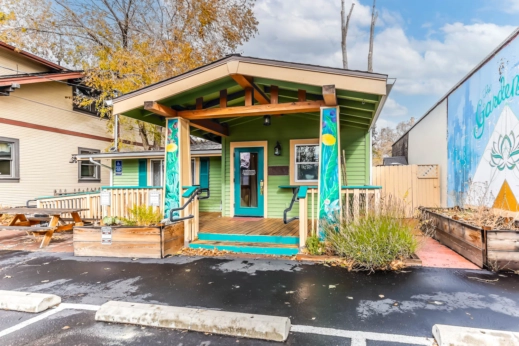Humans have been interacting with psilocybin derived from fungi since time immemorial. But its legal industry is brand new and experiencing growing pains.

In a second building on his property in Springfield, Oregon, Gared Hansen grows mushrooms containing psilocybin, a psychedelic compound that grows naturally in the environment. Hansen harvests the mushrooms after each flush sprouts from the bins and bags in which he plants them. Everything harvested within a 24-hour window counts as a harvest batch, which he sends to a certified lab to be tested. Once approved, Hansen, the owner of Uptown Fungus, packages the mushrooms and sells them to the handful of service centers that have opened in Oregon over the past few months.
“I try to grow to have a little bit more volume than my customers need, because new customers are popping up every couple of weeks,” says Hansen.
Psilocybin is a nascent legal market in Oregon—not even a year old. Psilocybin, however, is a mushroom component that has been regarded for its myriad influences—on spirituality, health, consciousness and more—for thousands of years. Federally, psilocybin is still classified as a Schedule One drug, but across the country, cities, states and communities are navigating what holistic psilocybin access can look like.
Measure 109
Indigenous cultures across the world have long had relationships with psychedelic plants and mushrooms, but legalizing psilocybin access is new to the US. In recent years, Oregon, and then Colorado, have been the only states in the US to legalize and decriminalize psilocybin, but several cities across the country have also passed decriminalization resolutions. Psilocybin was designated as a breakthrough therapy by the Food and Drug Administration for the first time in 2018, for its promising impact on treatment-resistant depression and other mental health conditions.
Tori Armbrust, owner of Satori Farms, was the first manufacturer of psilocybin to get her license in Oregon. This means that she grows mushrooms containing psilocybin—in Oregon, people who grow mushrooms for psilocybin are not called growers or cultivators but manufacturers. She applied for her license when applications opened, in January of 2023.
In 2020, Oregon voters passed Measure 109, which legalized the facilitated use of psilocybin for the public. Measure 109 made the Oregon Health Authority the governing body that would license and regulate the industry. Over the next two years, rules and regulations were developed for how this should work.
In her application, Armbrust navigated the requirements set by the OHA, including proving Oregon residency, getting a background check, paying the $500 application fee and the $10,000 annual licensing fee, acquiring premises and getting it approved. For growers and service centers, land use is one of the biggest hurdles to overcome.
Armbrust needed to find a space that met the zoning requirements. But even if a building is zoned appropriately, it doesn’t mean the location will work for psilocybin manufacturing, since psilocybin is still considered a Schedule One drug at the federal level.
“You have to get owner approval and signatures for this use because it is federally illegal,” says Armbrust. “That’s one of the biggest challenges because most commercial owners still carry loans and the loans can be affected if the bank finds out that we’re doing something federally illegal.”

A session room at a service center sponsored by Bendable Therapy. (Photo courtesy of Bendable Therapy)
Armbrust believes that psilocybin can help a wide range of people. But a key concern for her is that it’s not accessible at an affordable price point yet. Hansen of Uptown Fungus shares Armbrust’s concern.
“It’s really difficult for people to afford right now,” says Hansen. “All of the overhead that’s in place for all of the various different companies in the industry means that the end user is paying an awful lot of money to have an experience.”
A driving goal of Measure 109 was to make psilocybin something that is “a safe, accessible and affordable option” for age-appropriate clients who might benefit from using psilocybin. It’s not there yet. In this first year, the costs are too high for many people.
This is partly because, in Oregon, everyone in the industry becomes certified—manufacturers, testing centers, service centers and facilitators, who are with clients during their experience. Psilocybin itself isn’t expensive, but the licensing fees, taxes and the amount of time each client spends receiving service—a preparation session beforehand, an integration session afterward and several hours for the actual experience (or days, at some service centers)—mean that the costs of experiencing psilocybin at a service center quickly become expensive. Those costs are currently typically between $1,000 and $3,000 but can go as high as $15,000.
“I really try to work with the service centers and ask them number one not to mark up product ever, because I feel like the services are already incredibly expensive,” says Armbrust. “And it’s important for me that everybody can access this.”
Satya Therapeutics in Ashland, Oregon is currently the only business licensed to be both a manufacturer of psilocybin and a service center. Jennifer and Andreas Met operate both halves of their business in separate locations, due to zoning/county restrictions.
“This is a product that has been used for centuries by so many cultures before us,” says Jennifer. “And it can bring hope for individuals that are suffering or want to move forward and want to move forward with something that’s non-toxic and non-addictive.”
In Oregon, the actual facilitated psilocybin experience begins with a preparation session. In this meeting with a facilitator, the client discusses their intentions going into the experience, as well as what to expect. The facilitator stays with the client in the service center and keeps them safe but does not guide the experience of being in an altered state. Afterward, clients attend an integration session, wherein they process the experience with the facilitator.
At Satya Therapeutics, some facilitators will offer their services on a sliding scale. Full-price clients can help offset the cost for others. OHA requires that service centers come up with and document a social equity plan.
“You have to, as a facilitator, as a service center, be putting money aside for social equity,” says Jennifer.

A session room at a service center sponsored by Bendable Therapy. (Photo courtesy of Bendable Therapy)
Decriminalization
The strictly facilitated model is not the only way to envision psilocybin access; community-based ceremony, the ability to experience psilocybin around members of your own community, is preferable to many groups and cultures. Some advocates say that legalization without decriminalization makes community-based sharing less accessible.
In tandem with Measure 109, Oregon also passed Measure 110 to decriminalize psilocybin. Decriminalization is different than legalization—decriminalization means that the act is still illegal but that a person would not be prosecuted for it. Oregon and Colorado both passed legalization and decriminalization bills, but Oregon’s decriminalization bill is more restrictive—it decriminalized the possession of small amounts of psilocybin.
“I think the most important thing that happened in Oregon, that kind of took some of the grassroots, people-oriented, community-based healing out of the equation was that it’s still a felony to grow mushrooms,” says Larry Norris, Ph.D., co-founder and board member for Decriminalize Nature. “And it’s still a felony to pick a mushroom out of the ground.”
It’s also a criminal offense to share psilocybin in Oregon. Colorado, which is still in the planning phase, decriminalized cultivation and sharing.
“[Oregon] had really a lot of restrictions in the decriminalization bill,” says Norris. “So, it really kind of forces people into the 109 process, which is pretty expensive.”
Decriminalize Nature started in 2018 with a group of people in Oakland. They were able to get before the city council and help introduce a resolution to decriminalize four categories of plants and mushrooms, including mushrooms containing psilocybin. Today, there are Decriminalize Nature chapters across the country, working at the city level to remove the criminal penalties associated with psilocybin. Psilocybin, and other natural substances, often get pigeonholed by certain words such as medicinal or recreational. But Norris recommends a more holistic lens and an emphasis on helping people rather than profiteering.
“It kind of really grew pretty quickly,” says Norris. “I think a lot of people were excited. They really wanted to have a conversation about nature and our relationship with nature.”
Don’t say medicinal
When Oregon’s Measure 109 was initially introduced, there was a lot of talk about how research has shown the many mental health benefits of a psilocybin experience. But you do not need a prescription to access psilocybin services—the experience is open to anyone who pays the fees and meets the criteria set by OHA. Service center clients are required to sign an acknowledgment that they recognize they are not receiving medical or clinical services. And as a federally designated Schedule One drug, psilocybin services are not covered by insurance.
“We were sold Measure 109 as psilocybin-assisted therapy,” says Ryan Reid, co-founder of Bendable Therapy and president of Drop Thesis, the latter of which is a service center. But now service centers must be careful how they frame it.
What this means is that it can be confusing for Oregonians to understand if and how a psilocybin experience could benefit them. This is the need that Bendable Therapy addresses. Bendable Therapy is a navigation center, screening people and matching them with facilitators and service centers that can help meet their needs through psilocybin, if appropriate.

A service center sponsored by Bendable Therapy. (Photo courtesy of Bendable Therapy)
Licensed service centers and facilitators can’t advertise psilocybin as a medical or clinical treatment. Bendable Therapy coordinators, by contrast, aren’t licensed facilitators and therefore can provide education and explanation. “That’s another benefit of these coordination services, is they get to actually educate and be the voice on what this is and isn’t,” says Reid.
Colorado plans to start accepting license applications for psilocybin manufacturing and administration in late 2024. Representatives from the state have been in close contact with those involved in Oregon’s rollout to learn what works well and what could be different. Other states are likely to follow suit—Massachusetts voters may see a psilocybin measure on their ballots soon. While the legal frameworks are not homogenous, more communities in the country are asking how to make psilocybin-containing mushrooms, which have been growing naturally in the environment for the longest time, accessible to more people without risk of penalty.
At Bendable Therapy, they attract people who are on an existing mental health path, says Reid. Their clients have been working on a condition such as PTSD or depression and are now feeling stuck. Along with their health provider, they want to try psilocybin as a way to get unstuck.
“It is such a good tool in support of the existing mental health system,” says Reid. “I’m excited about that.”